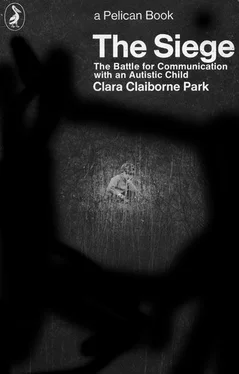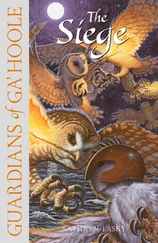The inertia of such a child might affect even cognitive functions, so that ideas that normal babies associate without apparent effort would be connected only with difficulty, and past experience would be only minimally available for use in new situations. All the autistic child’s deficiencies could be seen as converging in this one: the deficiency which renders it unable or unwilling to put together the primary building blocks of experience. It affects the senses, it affects speech, it affects action, it affects emotion. The autistic child does not move naturally from one sound to another, from one word to another, from one idea to another, from one experience to another. Yet reality, as human beings experience it, is a web of connections to be made. The reality of persons and emotions is the most complex web of all. The baby who can make little sense of the simpler interconnections will make even less sense of these complexities; it will be ‘deficient in affective functions’. Because this deficiency is more conspicuous than the others, it will tempt us to consider it as primary. But if over years we watch this deficiency steadily diminish, while others simply change their faces, we will begin to wonder.
Not all individuals possess all the characteristics of the species — even the essential ones. By imagining an individual born with the capacity to explore the environment, but with whatever it is that determines the drive to do so absent or grossly impaired, we can arrive at all the characteristics of the autistic child. Because of the negative survival-value of the trait, such individuals would be uncommon — as autistic children are. But such a hypothesis would explain much that other explanations leave untouched.
I have deferred discussing one last deficiency of Elly’s until now, almost at the end of the story, because it is so pervasive and difficult to catch hold of that the appreciation of it has need of all that has gone before. It is directly related to the lack of exploratory drive, for it concerns Elly’s signal lack of interest in future experience. My husband thought of the word for it — one day, watching as Elly moved with agonizing slowness through the hundreds of motions that were necessary before she could reach the enjoyable experience of school, he exclaimed, ‘It’s the sense of purpose that’s missing!’ We began then to think about purpose and what it entails, and to relate it to a lack in Elly we had long felt without being able to give it a place in the total picture.
Purpose entails drive and the capacity to sustain. But it entails another capacity as well, one which itself plays an obvious part in motivation — the capacity to imagine , to bring to mind and take seriously what is not, or not yet, present to immediate experience. The middle-class boy does not need much imagination to see himself as a stable and prosperous professional man; the boy from the ghetto, to sustain the same vision, must possess imagination to a remarkable degree. I return to Elly’s simplicity of mind, the emptiness of her horizons.
She is curiously matter-of-fact. The Institute, long ago, told us she had many fears, and at the time we were quite ready to assent. Fuller experience has made us less so. Fear is not mere anxiety, such as Elly exhibits daily when some trivial thing goes wrong. Fear envisages; it imagines; it is anxiety in anticipation. It is fear, not of what is visibly present, but of what may be going to happen . If this distinction is granted, I cannot recall a situation in which Elly seemed to feel fear, and I can recall many in which fear seemed natural and she exhibited none. She could not, for example, be brought to fear traffic. She knows about looking both ways before crossing a street, but she never does it unasked, and if asked she looks without looking. The idea that a car might really hurt her seems to defy communication — and this though at five she was actually knocked down by a truck. I have tried to make use of a certain three-legged dog in this connection, but he conveys no realization of danger, although he provides an occasion for ritual joking. ‘Dog hurt! Only three legs! Go hospital!’ It is not that Elly does not know what cars can do. It is that she cannot imagine it.
Her attitude towards dogs in general provides another illustration of the difference between fear, which envisages what is not present, and anxiety, which does not. Elly is anxious in the presence of rambunctious dogs, but she would never refuse to visit a house where from previous experience she might expect to meet one. Relevant here also is the absence of hallucinations that has been noted in autistic children. What is hallucination but imagination so vivid that it takes over the very mechanisms of the senses themselves? In contrast, Elly’s sense of what is and is not the case is unusually sharp; it is the main source of her humour. At four, her father taught her to pretend, mimicking bedtime, laying her on the floor with a sheet of paper for a blanket, a stick for a doll, while she laughed at the ridiculousness of it all. At seven and eight she could pretend a little for herself (significantly, ‘real’ and ‘pretend’ were adjectives she learned very easily). Seeing her suck her thumb, I told her it was chocolate; she herself added ‘strawberry’ and ‘vanilla’. Recently she stroked me, giggling ‘Furry, furry Mama!’ There could be no possible doubt that this was a joke, part of a constant and enjoyable interplay between truth and falsehood. ‘Is Mama downtown?’ ‘No!’ ‘Did Jill go downtown?’ ‘Yes!’
No hallucinations, no fantasies. We could use some; they would make her play much richer. Nor have we ever seen any evidence of nightmares. Her focuses of severe anxiety all have the same characteristic — they are immediate and visible. I do not say that she is like the boy in the Grimms’ fairy tale who could not shudder. But it is certainly true that one of the reasons it is so hard to read her the simplest children’s story is that she is as yet incapable of understanding why Peter Rabbit was afraid of Mr MacGregor, because for her out of sight is out of mind.
As with fear, so with other emotions. To attain its full human complexity, emotion must include an element of imagination. Jealousy would be a minor affliction indeed if we felt it only in the actual presence of the loved one. Without the power to envisage, to interconnect, to bring to bear past and future, we should experience only a very simplified version of hatred or affection or love. And if the deficiency in imagination is relevant to deficiency of affect, its relevance to the deficiency of exploratory activity is even clearer. Recently I played hunt-the-button with Elly and discovered that she could envisage no new hiding places. Though I restricted the hiding places to my own person, Elly could find the button only if left in plain sight, or in places I had hidden it previously.
A final illustration of this matter-of-factness is her attitude towards blood. Blood can be a touchy subject for children and psychiatrists — for children, the focus of much emotion and fantasy, for psychiatrists, of much theory. Elly knows about menstrual blood. In the general lack of privacy attendant on life with Elly I made an effort to keep this inconspicuous, but over a period of years there are bound to be slip-ups. There was reason to worry about Elly’s reaction to blood, especially since there were no words for explaining the phenomenon to her. I was not reassured when to ‘Red blood, hurt!’ she added ‘Leave your tail alone’, showing that she had made a connection between masturbation and menstruation, which I was as far from being able to discourage as I was from having suggested it. But she exhibited no anxiety, let alone fantasy or fear, and subsequent developments showed that her matter-of-factness was not a blind. There are indeed patterns to be found in reality, as plausible as those we find in psychology books, but considerably less interesting. ‘Brush teeth, red blood hurt,’ Elly remarked soon after, and it was true. Mother has only to brush her teeth to produce red blood; Elly picks a scab and red blood comes. ‘Don’t pick-uh nose, ha’ red blood!’ — and Elly has in fact induced several nose-bleeds in this way. It is all of a piece, and the fabric is very simple.
Читать дальше












